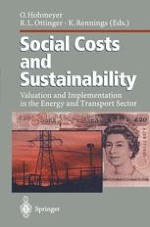1997 | OriginalPaper | Chapter
Economic Effects of an Ecological Tax Reform
Authors : Stefan Bach, Michael Kohlhaas, Barbara Praetorius
Published in: Social Costs and Sustainability
Publisher: Springer Berlin Heidelberg
Included in: Professional Book Archive
Activate our intelligent search to find suitable subject content or patents.
Select sections of text to find matching patents with Artificial Intelligence. powered by
Select sections of text to find additional relevant content using AI-assisted search. powered by
The need to realize sustainable economic development, which preserves the basis for human existence, is now widely recognized. Natural resources must be used more economically and the burden on the environment eased. The traditional instruments of environmental policy, in particular the use of command and control measures, are inadequate for this purpose and induce economic costs which are unnecessarily high. In the light of this, an ecological reform of the taxation system involving the greater use of environmental charges is a demand which has been frequently raised in the environmental discussion. Such a reform, it is argued, would enable environmental objectives to be realized more efficiently. The revenue from such taxes is to be refunded to those social groups paying the tax, or other taxes or charges are to be reduced to a corresponding extent. In this way, negative economic or social side-effects of environmental charges can be mitigated, and a “double dividend” can be obtained by reducing distortions that are caused by existing “traditional” taxes.
